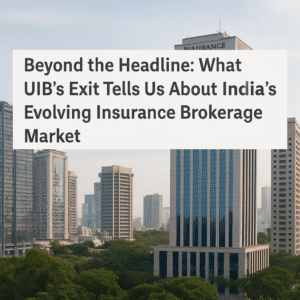Beyond the Headline: What UIB’s Exit Tells Us About India’s Evolving Insurance Brokerage Market
Global insurance broker UIB International has exited India after 15 years, selling its stake in UIB Insurance Brokers (India) to Edme Services, backed by private equity firm Samara Capital. This move signals a significant shift in India’s brokerage landscape, reflecting the challenges global players face scaling locally against intense competition. Crucially, Edme will retain UIB’s core team, ensuring client continuity while advancing Samara’s strategy to build a consolidated, pan-Indian insurance distribution platform.
The deal underscores a broader trend of private equity aggressively investing in consolidating India’s fragmented brokerage sector, valuing scale and local expertise. UIB’s departure isn’t a failure but a strategic realignment, highlighting that deep local roots and focused investment are increasingly vital for success beyond serving multinationals. This exit accelerates market maturation, where scale, technology, and strong domestic partnerships are becoming paramount. The result is a reshaping of the industry, favoring large, PE-backed local consolidators over some global models, ultimately leading to more sophisticated brokers for clients and insurers alike.

Beyond the Headline: What UIB’s Exit Tells Us About India’s Evolving Insurance Brokerage Market
The departure of international broking giant UIB International from India after 15 years marks more than just a corporate exit; it signals a significant shift in the dynamics of India’s insurance distribution landscape. The sale of UIB’s minority stake in UIB Insurance Brokers (India) to Edme Services, an affiliate of private equity firm Samara Capital, isn’t merely a transaction – it’s a strategic handover reflecting broader industry trends.
The Deal Unpacked:
- Global Player Exits: UIB International, having established its Indian arm in 2011, has decided to divest its entire minority shareholding.
- Local Consolidator Steps In: The buyer, Edme Services, is part of Samara Capital’s focused strategy to build a substantial presence in Indian insurance distribution. This acquisition fits perfectly into their model of aggregating brokerage firms.
- Continuity Assured: Crucially, Edme has committed to retaining UIB India’s core team. This ensures stability for clients and leverages the expertise built over 15 years.
- Collaborative Sale: The transaction was executed in partnership with UIB India’s long-standing majority shareholders, the Indorama SPL Group and the Lucas & Mayo Group, concluding a strategic review.
Reading Between the Lines: The Human Insight
- The Allure (and Challenge) of India: UIB’s initial entry in 2011 coincided with optimism about India’s growing insurance market. While the company built a respected operation, the exit suggests the complexities and competitive intensity of scaling in India may have prompted a strategic reassessment for the global parent, potentially reallocating resources to core markets or regions with different growth dynamics.
- Private Equity Bets Big on Distribution: Samara Capital’s acquisition through Edme isn’t an isolated move. It’s part of a clear pattern of private equity firms recognizing the immense potential in consolidating India’s fragmented insurance brokerage sector. PE sees value in creating scaled, efficient, pan-India distribution platforms capable of serving diverse client needs. Edme’s statement about building a “pan-India insurance distribution business” underscores this vision.
- Consolidation is the New Normal: This deal is part of a flurry of activity in the Indian broker space (evident in the “Related News” – new appointments, association chapters). Smaller, specialized brokers are increasingly attractive targets for larger players or PE-backed consolidators like Edme. Scale brings advantages in technology investment, talent retention, and bargaining power with insurers.
- Continuity Over Chaos: Edme’s commitment to retaining UIB India’s core team is strategically vital. It mitigates client disruption and preserves the institutional knowledge and relationships crucial in the brokerage business. This focus on smooth transition is a positive sign for the health of the market during consolidation.
- The Evolving Role of Global Brokers: While global giants remain important, especially for large multinational clients, this exit highlights that dominating the complex Indian mid-market requires deep local roots, agility, and sometimes, the backing of investors specifically focused on the long-term domestic opportunity. Local partnerships and ownership structures are proving critical.
The Bigger Picture:
UIB’s exit isn’t a failure story; it’s a strategic realignment. It reflects:
- Market Maturation: India’s insurance brokerage sector is evolving rapidly, moving beyond initial foreign entry to a phase dominated by strategic consolidation and the creation of large, sophisticated local/regional powerhouses.
- PE as a Catalyst: Private equity is playing a transformative role, providing capital and strategic direction to drive consolidation and professionalization.
- Focus on Local Execution: Success increasingly hinges on deep local understanding, strong management teams, and the ability to navigate the unique Indian business environment – attributes PE-backed platforms like Edme aim to institutionalize.
What This Means for the Industry:
Clients can expect to engage with larger, potentially more tech-enabled brokers offering a wider suite of services. For brokers, the pressure to scale, specialize, or find the right strategic partner (acquirer or investor) intensifies. Talent retention remains paramount. For insurers, the rise of large, consolidated distributors means dealing with more sophisticated and potentially more influential partners.
UIB’s chapter in India closes, but it opens a significant new page in the story of India’s insurance distribution, written increasingly by focused local consolidators backed by strategic capital. The game is no longer just about global reach; it’s about deep local integration and scale.
You must be logged in to post a comment.